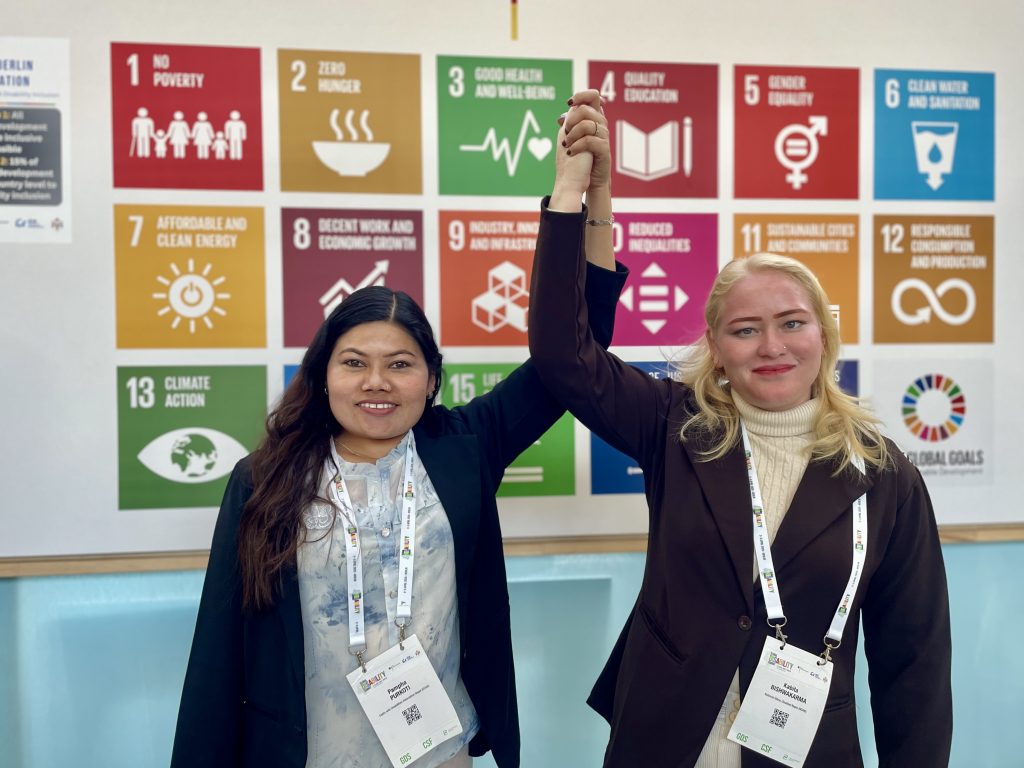From Global to Local: Bringing GDS 2025 Commitments to Life
Blog by An-Sofie Leenknecht

Nepali disability rights activists, Pampha Purkoti and Kabita Bishwakarma, at the GDS Summit in Berlin. Photo: Rucha Chitnis
As the official commitments from the Global Disability Summit (GDS) 2025 are now public via the GDS portal, disability rights activists and organizations of persons with disabilities (OPDs) around the world are asking: What now?
On June 25, 2025, Disability Rights Advocacy Fund hosted a dynamic online session exploring how GDS commitments can catalyze meaningful policy and legal reforms at the national level. Speakers from the GDS Secretariat, Indonesia, and Uganda, and participants from around the globe shared lessons, better practices, and strategies for moving from international pledges to real impact for persons with disabilities.
Key Learnings and Takeaways
Commitments on the Rise — A Tool for National Advocacy
Greta Gamberini, Manager at the GDS Secretariat, confirmed that the number of commitments submitted to GDS 2025 has increased significantly compared to 2022, with nearly half of the 815 commitments coming from government actors. This surge reflects a growing political will to advance disability rights and implement the UN Convention on the Rights of Persons with Disabilities (CRPD).
Global Disability Summit is a Political Opportunity
“We should not treat the GDS as a stand-alone event that happens every four years,” said Yeni Rosa Damayanti, the speaker at the learning session from the Indonesian Mental Health Association. “It is a political tool, a catalyst, to push for national reform and long-term movement building.”
Video: “You have to have strong roots at the local and national level.”
Yeni outlined how disability rights advocates in Indonesia used GDS 2025 to revive delayed regulations, including a critical social protection measure offering utility discounts, an important means to address disability-related extra costs. By spotlighting government commitments made during GDS, OPDs were able to exert pressure on ministries to implement what had been postponed.
She emphasized the value of GDS in creating a sense of urgency, opening dialogue with key actors, and reinforcing multi-sectoral accountability mechanisms.
GDS Commitments Must Be Anchored in Strong Local Movements
“All global commitments and UN conventions are meaningless if we don’t have strong national and local movements to pressure governments to implement them,” Yeni said.
She stressed the importance of building inclusive, intersectional coalitions within disability communities, ensuring that each group is represented by their own members. “We must work as a united front, but never speak on behalf of each other,” she added. “This is about real inclusion.”
Disability-Inclusive Development Must be Funded and Tracked
“It’s not enough to have policies on paper. We must ensure governments allocate budgets and track spending so that commitments result in actual improvements in people’s lives,” said David Nangosi with the National Union of Disabled Persons of Uganda.
Both David and Yeni emphasized the importance of budget advocacy. Commitments mean little if they are not backed by proper resourcing.
“We need to ensure that advocacy does not stop at policy level, but also follows the money,” said Yeni. “Track how budgets are allocated and whether they reach the people.”
From Commitments to Accountability: Final Reflections and Next Steps
“If you go to the GDS and come home and nothing happens, that’s a waste of money,” said Yeni—underscoring a central message: global commitments must lead to real local change.
A key tool for this is the GDS monitoring and reporting system. Reporting on 2022 commitments is already underway, while the first reporting window for 2025 commitments will open around March 2026 and repeat annually. This gives OPDs a clear timeline to gather evidence, build alliances, and demand accountability.
Speakers also stressed that GDS pledges are only one part of a broader advocacy strategy. Governments have binding obligations under the UN Convention on the Rights of Persons with Disabilities and can be held to account through mechanisms like the Universal Periodic Review, UN treaty bodies, and budget monitoring.
To turn commitments into impact, international frameworks must be matched by grassroots action. Sustained local advocacy is essential to ensure that the promises made at GDS 2025 result in meaningful change for persons with disabilities.